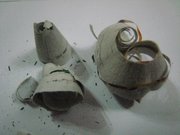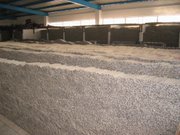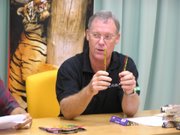The turn of the 21st century has been marked by the greatest challenge the human species has ever faced. Over the next few decades, our generation will be entrusted with the colossal responsibility of erasing mankind’s impending path to self-destruction. The damage we have wreaked upon this planet is substantial, and no matter what many of us are told to believe, I implore you to accept the deadly seriousness of this problem.
Essentially, the environmental crisis exists on two different levels. The first is rather obvious: our direct contribution, in the form of garbage and fuel emissions, logging and burning.
Today, we know we live on a planet with finite resources. Our consumption of materials is brutally taxing on the natural world. Humans simply cannot afford to have an insatiable appetite. If the entire world lived like the average American, we would need three earths to meet the demands imposed. And while some of us may frown at American culture, for many people it is sadly the social and economical ideal.
Still, the second problem may be even more worrying: human denial. Our ability to conveniently turn a blind eye to what we know in our hearts to be true is extremely disconcerting.
Few people today could scientifically challenge the existence of global warming (it was discovered recently that the central argument by opponents of global warming was based on incorrect data). Many shrug it off, however, unable to deal with the uncomfortable notion that the earth is being destroyed in front of their very eyes. The reality, as with any problem that we face as individuals, remains the same: the sooner we accept, the quicker we repair.
Others downplay the significance of the problem. Ignore them. The problem is huge, and it is staring us straight in the face. We just need to open our eyes and look for ourselves. Hurricane Katrina, like any of the dozens of hurricanes that form year round, was a natural phenomenon. Yet many scientists today argue that the severity and strength of such storms are dependent upon heat energy from the ocean, and human beings, through the process of global warming, are heating the ocean faster and faster.
If the fact that hurricane occurrences have nearly doubled in the last five years does nothing to convince you, there are other examples. Coral reefs, extremely dependent on cool, precise water temperatures, have been projected to disappear completely in as few as 20 years.
Biodiversity is being destroyed at a rate rapid enough to be labeled an “era of extinction.” High contents of mercury found in marine fish, such as tuna, routinely make people sick. To date, there are 146 “dead zones” (some up to 70,000 square kilometers in size) in the world’s oceans where marine life simply cannot exist.
In fact, we Malaysians should understand the severity of environmental destruction better than most, having recently been on the receiving end of disgusting levels of haze, a product of the forest fires in
One of
Part of this process of understanding the problem must include understanding the consequences of inaction. This catastrophe affects each and every one of us dramatically, whether we notice it or not. Do we not all love clean water, fresh air and healthy life? These fundamentals, which many of us take for granted, are disappearing rapidly.
Every day, people and animals die because of how we live our lives, polluting and over-consuming. When a crisis threatens our very existence, do we not have a responsibility to unite and respond?
If you dare ask why we should care about the state of our world long after we are gone, my response would be simple: It is a good thing the people before us didn’t adopt the same attitude towards you.
Unfortunately, the first hurdle of accepting our situation is also the easiest. Complaining about our situation often seems natural, yet it serves no useful purpose. Changing the way we behave is a difficult but vital step in the right direction. The harsh reality is that improving the state of our planet cannot happen without sustained effort at the individual level. We will have to roll up our sleeves, get dirty and teach ourselves to overcome this mess.
It all starts with simple acts, from turning off lights to learning how to recycle, from writing your local newspaper to discussing this plight with your friends and family.
I understand how insignificant these small, troublesome acts must appear. Many will ask, “What difference can I possibly make?” Always remember that every revolution begins with the smallest of sparks, and we are taking part in possibly the most important social movement history has ever seen.
It is an enormous challenge but each and every one of us, with the proper approach, can contribute significantly to its success. In the words of environmentalist Lester B. Milbrath: “Those who understand what is happening to our world are not free to shrink from this responsibility.” Whether we like it or not, this knowledge bestows upon us a moral duty to protect this stunning planet.
This understanding has never been more important than it is today. In one of my recent university classes, a fellow classmate likened the environmental crisis to a speeding train, heading towards the edge of a cliff.
Today, we suffocate and pollute ourselves more than ever before. Granted, slamming on the brakes may not reward us immediately. It will take time to completely stop. However, consider the dire consequences of doing nothing at all. The fall will be excruciatingly painful.

















No comments:
Post a Comment